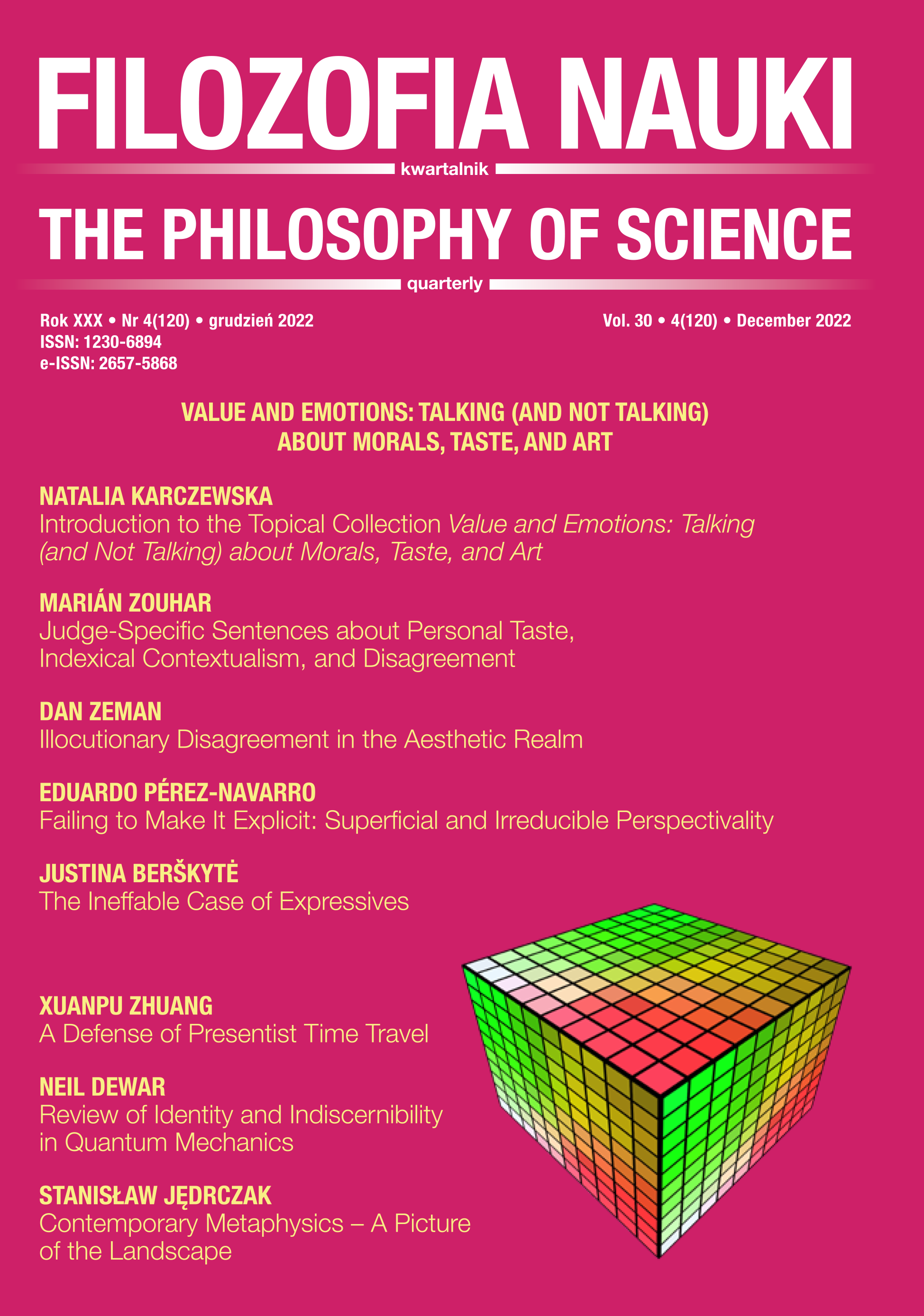The Ineffable Case of Expressives
DOI:
https://doi.org/10.14394/filnau.2022.0035Słowa kluczowe:
expressives, descriptives, descriptive ineffabilityAbstrakt
Expressive terms (damn, fuck, bastard) are said to convey speakers’ attitudes and feelings. These can be positive or negative, depending on the context. In this paper, I focus on the property of expressives that I take to be of the most importance: descriptive ineffability. Descriptive ineffability is a property of expressive terms for which no suitable descriptive paraphrase can be found that
captures the full meaning of the expressive. In the face of arguments that attempt to show either that descriptive terms also carry this feature or that expressives (at least in some instances) can be effable, I defend the idea that descriptive ineffability is unique to expressives. I end the paper by considering what descriptive ineffability can teach us about expressive terms.
Bibliografia
Belleri D. (2014a), Semantic Under-Determinacy and Communication, London: Palgrave Macmillan. https://doi.org/10.1057/9781137398444
Belleri D. (2014b), “You Can Say What You Think: Vindicating the Effability of Our Thoughts,” Synthese 191(18): 4431–4450. https://doi.org/10.1007/s11229-014-0537-8
Berškytė J. (2021), “Jeremy Is a... Expressive-Relativism and Expressives in Predicative Positions,” Synthese 199, 12517–12539. https://doi.org/10.1007/s11229-021-03341-y
Berškytė J. and Stevens G. (2023), “Faultless Disagreement without Contradiction: Expressive-Relativism and Predicates of Personal Taste,” Linguistics and Philosophy 46, 31–64. https://doi.org/10.1007/s10988-022-09353-2
DiFranco R. (2017), “Derogation without Words: On the Power of Non-verbal Pejoratives,” Philosophical Psychology 30(6): 784–808. https://doi.org/10.1080/09515089.2017.1315765
Drożdżowicz A. (2016), “Descriptive Ineffability Reconsidered,” Lingua 177: 1–16. https://doi.org/10.1016/j.lingua.2015.12.011
Gäb S. (2020), “Ineffability: The Very Concept,” Philosophia 48(5): 1825–1836. https://doi.org/10.1007/s11406-020-00198-2
Geurts B. (2007), “Really Fucking Brilliant,” Theoretical Linguistics 33(2): 209–214. https://doi.org/10.1515/TL.2007.013
Gutzmann D. (2013), “Expressives and Beyond: An Introduction to Varieties of Use-Conditional Meaning” [in:] Beyond Expressives: Explorations in Use-Conditional Meaning, D. Gutzmann and H.-M. Gärtner (eds.), Leiden: Brill, 1–58. https://doi.org/10.1163/9789004183988_002
Gutzmann D. (2015), Use-Conditional Meaning: Studies in Multidimensional Semantics, Oxford: Oxford University Press. https://doi.org/10.1093/acprof:oso/9780198723820.001.0001
Gutzmann D. (2016), “If Expressivism Is Fun, Go for It” [in:] Subjective Meaning: Alternatives to Relativism, C. Meier and J. van Wijnberger-Huitink (eds.), Berlin: De Gruyter, 21–46. https://doi.org/10.1515/9783110402001-003
Hom C. (2008), “The Semantics of Racial Epithets,” The Journal of Philosophy 105(8): 416–440. https://doi.org/10.5840/jphil2008105834
Hom C. and May R. (2018), “Pejoratives as Fiction” [in:] Bad Words, D. Sosa (ed.), Oxford: Oxford University Press, 108–131.
Jakobson R. (1960), “Linguistics and Poetics” [in:] Style in Language, T. Sebeok (ed.), Cambridge, Mass.: MIT Press, 350–377.
Jay T. and Janschewitz K. (2007), “Filling the Emotion Gap in Linguistic Theory: Commentary on Potts’ Expressive Dimension,” Theoretical Linguistics 33(2): 215– 221. https://doi.org/10.1515/TL.2007.014
Jeshion R. (2013), “Expressivism and the Offensiveness of Slurs,” Philosophical Perspectives 27(1): 231–259. https://doi.org/10.1111/phpe.12027
Kaplan D. (1999), The Meaning of Ouch and Oops: Explorations in the Theory of Meaning as Use, Los Angeles: UCLA (manuscript).
Kratzer A. (1999), “Beyond ‘Ouch’ and ‘Oops’: How Descriptive and Expressive Meanings Interact,” paper presented at the Cornell Conference on Theories of ContextDependency, handout available: https://semanticsarchive.net/Archive/WEwNGUyO/Beyond%20%22Ouch%22%20and%20%22Oops%22.pdf.
Lasersohn P. (2007), “Expressives, Perspective and Presupposition,” Theoretical Linguistics 33(2): 223–230. https://doi.org/10.1515/TL.2007.015
Lasersohn P. (2017), Subjectivity and Perspective in Truth-Theoretic Semantics, Oxford: Oxford University Press. https://doi.org/10.1093/acprof:oso/9780199573677.001.0001
Lindemann B., Ogiwara Y., and Ninomiya Y. (2002), “The Discovery of Umami,” Chemical Senses 27(9): 843–844. https://doi.org/10.1093/chemse/27.9.843
McCready E. (2010), “Varieties of Conventional Implicature,” Semantics and Pragmatics 3(8): 1–57. https://doi.org/10.3765/sp.3.8
Mildenberger C. D. (2017), “Expressives, Majoratives, and Ineffability,” Kriterion – Journal of Philosophy 31(2): 1–16. https://doi.org/10.1515/krt-2017-310202
Potts C. (2007), “The Expressive Dimension,” Theoretical Linguistics 33(2): 165–198. https://doi.org/10.1515/TL.2007.011
Scott M. and Citron G. (2016), “What is Apophaticism? Ways of Talking About an Ineffable God,” European Journal for Philosophy of Religion 8(4): 23–49. https://doi.org/10.24204/ejpr.v8i4.1716
Scott M. and Stevens G. (2019), “An Indexical Theory of Racial Pejoratives,” Analytic Philosophy 60(4): 385–404. https://doi.org/10.1111/phib.12156
Spackman J. S. (2012), “Expressiveness, Ineffability, and Nonconceptuality,” The Journal of Aesthetics and Art Criticism, 70: 303–314. https://doi.org/10.1111/j.1540-6245.2012.01522.x
Travis C. (1997), “Pragmatics” [in:] A Companion to the Philosophy of Language, B. Hale and C. Wright (eds.), Oxford–Malden, Mass.: Blackwell, 87–107.
Pobrania
Opublikowane
Jak cytować
Numer
Dział
Licencja
Prawa autorskie (c) 2022 Justina Berškytė

Utwór dostępny jest na licencji Creative Commons Uznanie autorstwa – Użycie niekomercyjne – Bez utworów zależnych 4.0 Międzynarodowe.



















 Filozofia Nauki | ISSN 1230-6894 | e-ISSN 2657-5868
Filozofia Nauki | ISSN 1230-6894 | e-ISSN 2657-5868